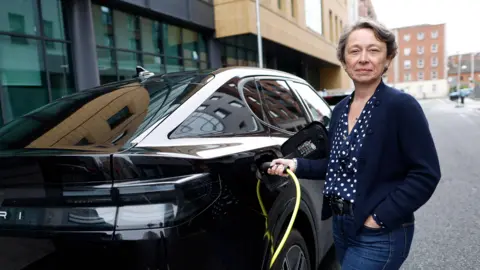Ford CEO Lisa Brankin warns against taxing electric cars
josh martin,Business reporter and
sean farrington,Business presenter
 Barry Cronin
Barry CroninFord’s UK boss has warned that taxes on electric cars could prevent drivers from buying them at a time when demand has “lost momentum”.
It comes after the BBC reported that Chancellor Rachel Reeves may be considering it New fees on electric vehicles in the upcoming budget
“It’s definitely not the time to do this,” Lisa Brankin, Ford’s UK chief executive, told the BBC.
A Treasury spokesman said: “Fuel duty covers petrol and diesel, but there is no equivalent for electric cars. We want a fairer system for all drivers.”
The Chancellor is reportedly considering introducing new pay-per-mile charges for electric cars from 2028.
Ms Brankin told the BBC’s Big Boss Interview programme: “This [policy]“In the face of really fragile demand for electric vehicles, it’s just another brake.”
She says the administrative task of counting miles driven can deter potential EV owners from making the switch.
“It’s really easy to sell people the things they want,” she says. “It’s hard to sell people things they don’t want.
“Electric cars have in some cases gone from being a cool thing to being something we’re trying to push people into.”
 Reuters
ReutersFord sells the UK’s most popular car, the Ford Puma, while its Transit commercial van is second in sales.
For years its Focus model was the most popular in the UK, but the American company has ditched the hatchback and the last Ford Focus rolled off the factory lines in Germany last week.
The company employs around 6,000 people in the UK, and has an engine plant in Dagenham and a transmission plant in Halewood. No car has been manufactured here since 2013.
Ford, like other carmakers, is under pressure to achieve a net zero plan in the UK, where 80% of new car sales must be electric vehicles by 2030 or face fines.
The Government has reintroduced a grant worth up to £3,750 to encourage drivers to buy electric cars.
Ms Brankin said Ford would not be able to reach the 80% target without government help, such as the grant.
Sales figures released by car industry body the Society of Motor Manufacturers and Traders (SMMT) show how far carmakers have to go to reach the target.
Fully electric cars accounted for about 22.4% of total new car sales, according to data for 2025 through October 31. At this time last year, the percentage was 18.1%.
In September, the UK new car market saw its best performance since 2020, driven by a rally Electric vehicle sales reach record highAccording to SMMT numbers.
However, Ms Brankin pointed to significant discounts at car sales lots as well as falling resale value in the used electric car market as indicators that the market is “distorted”.
“When that [target] Defined several years ago, the demand outlook for electric vehicles has been buoyant and there appears to be momentum behind electric vehicles. “What we are seeing now is that customer demand is not keeping up with that ambition,” Ms Brankin said.
A large share of new corporate EVs are sold to their employees, and benefit from lower “company car tax” rates compared to diesel or petrol options.
Ms Brankin has urged the Chancellor to reserve this tax advantage for companies that “green” their vehicle fleets.
The shift to electric vehicles could have consequences for the nearly 1,800 employees at Ford’s diesel engine plant in Dagenham, which was Europe’s largest car plant when it was first built.
Ms Brankin said Ford had not yet made any decisions about the future of the plant, which will produce diesel engines until 2030.
“We’re working really hard on what the next life for Dagenham looks like,” she said, but “there’s nothing we’ve settled on at the moment.”

